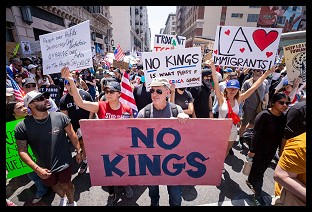 While the nation claws its way out of a pandemic and the Republican party continues to crack up --- or carry out its slow-motion attempted coup, take your pick --- a landmark moment occurred for the planet a week or so ago, which has left the fossil fuel industry reeling and describing as "Black Wednesday", even as it's received much less attention than it should have. On today's BradCast we aim to make up for that imbalance a bit. [Audio link to full show is posted below this summary.]
While the nation claws its way out of a pandemic and the Republican party continues to crack up --- or carry out its slow-motion attempted coup, take your pick --- a landmark moment occurred for the planet a week or so ago, which has left the fossil fuel industry reeling and describing as "Black Wednesday", even as it's received much less attention than it should have. On today's BradCast we aim to make up for that imbalance a bit. [Audio link to full show is posted below this summary.]
First up today, however, while Donald Trump has reportedly been telling anyone who will listen that he expects to be "reinstated" as President of the United States in August, the rightwing Charlie Cooke at the rightwing National Review confirms that reporting himself, while attempting to offer a dose of reality to his party at the same time. As he explains, even if it's true that Joe Biden and the Democrats and dead Hugo Chavez and Dominion Voting Systems and China actually did hack thousands of voting systems to steal the election from Trump (and, as he notes, they absolutely didn't), there is still no legal or Constitutional mechanism to simply "reinstate" Trump as President. It doesn't work that way in America, and the idea is, as he describes, both "otherworldly and obscene". Anyone who is deluded to the contrary, Cooke correctly explains, is "unmoored from the real world" and "living in a fantasy world" along with the disgraced former President.
But has Trump actually lost touch with reality while living in exile at Mar-A-Lago? Or is there another, more insidious reason entirely that he would want his MAGA Mob to believe he is about to be reinstated to the White House this summer? Yes, in fact, there is such a reason, as we discuss.
Then, it's on to "Black Wednesday". For context, however, we go back to an explosive report from 2018 [PDF] in which the non-profit Center for International Environmental Law (CIEL) detailed a treasure trove of internal documents from Royal Dutch Shell, going back to the 1950s, revealing that the company's scientists were not only aware at the time, but very concerned about the threat of climate change due to the release of CO2 from the burning of their products. In 1962, one of their scientists warned, according to the memos unearthed by CIEL, that "greatly increasing use of the fossil fuels...is seriously contaminating the earth's atmosphere with CO2," leading their Chief Geology Consultant at the time to urge "serious consideration of the maximum utilization of solar energy."
By 1991, the company had even produced a documentary called Climate of Concern, warning of the threat of global warming thanks to the unfettered release of greenhouse gasses into the atmosphere. Just a few years later, however, Shell took a u-turn and joined with Exxon and other major fossil fuel producers to fund the climate change denial industry, while lying to shareholders about the threat of our now-worsening climate emergency and the stranded assets all such companies are likely to face in the years ahead.
That denial, however, may have come to a screeching halt a week ago Wednesday for Royal Dutch Shell, following a court ruling by a Dutch court ordering them to cut emissions by 45 percent and, on the very same day, by shareholder "rebellions" at both Chevron and ExxonMobil. That landmark day, May 26th, which our guest today describes as "sending shockwaves" through the industry, has now come to be known as "Black Wednesday".
We're joined today by CARROLL MUFFET, President and CEO of CIEL, whose report on Shell from three years ago (which he joined us to discuss at the time), helped play a role in last week's court ruling against Shell. Today he explains those "shockwaves" throughout the industry and just how momentous "Black Wednesday" will likely prove to be for Shell, Chevron, Exxon and others, after their very bad day in both the courtroom and the boardroom.
"This last week has been nothing short of extraordinary," Muffett extolls. "It's been a watershed moment for the industry, and a watershed moment for those us who have been working for decades to hold the industry accountable --- not only for its past, but for what its business models mean for the future."
For Chevron that day, shareholders voted to impose long-overdue emissions targets on the company, and Exxon's shareholders elected at least three "activist" candidates to the company's 12-member Board of Directors, displacing the company's preferred directors with climate advocates from a newly formed investment firm. The vote at Exxon was backed by major investors like BlackRock and Vanguard.
Muffett describes the "remarkable convergence" of that day. "Liabilities that we've been warning about for a decade, responsibilities that we've been warning about for a decade, and financial risks that we've been warning about for a decade, are finally no longer fringe. They are mainstream. And now it's investors and courts saying to these companies what we've been saying for a very long time."
He explains how the Dutch court held Shell "responsible for all of the emissions that result from its operations. And that includes not only the emissions that come from Shell pulling the oil out of the ground, but the much greater emissions that come when the oil and gas are sold and burned." He also details how the shareholder votes at both Chevron and Exxon ("the biggest shakeup of them all") was even more stunning in a number of ways, as all three companies will now be forced to make "significant changes" to their business models and what they invest in. In Shell's case, for example, "the court is saying that it is not enough to reduce the emissions associated with producing the oil, you effectively have to produce less oil."
That ruling has sent an unmistakable message, he suggests, to all of the major oil companies, one which they should have heard --- and, arguably did, but ignored and/or lied about --- long ago. "It's important to recognize that, if you look at the major oil and gas companies, they've been under-performing the S&P 500 for a decade," Muffett tells me. "Even before the pandemic began, they were losing money, losing value, they had begun writing off billions of dollars in assets --- phenomena that were accelerated by the pandemic. What's become clear to a growing number of investors is that these business models are putting not only the planet, not only human rights, not only human lives on the line, but they're also putting investors' money on the line. Unfortunately, that's what it took to get investors engaged."
But with both investors and courts now engaged, "Black Wednesday" has become both a "remarkable shockwave" and "a wake-up call" to investors and, hopefully, the world. "I would say that the entire future of these companies will be defined by litigation of one kind or another. How long that future will last, I don't know. It is unlikely to outlast the litigation," says Muffett...
(Snail mail support to "Brad Friedman, 7095 Hollywood Blvd., #594 Los Angeles, CA 90028" always welcome too!)
|


 With Thanks, No Kings and Good Cheer
With Thanks, No Kings and Good Cheer Presidential Illegality and the Duty to Disobey
Presidential Illegality and the Duty to Disobey Sunday 'Leave 'em in Stitches' Toons
Sunday 'Leave 'em in Stitches' Toons President of United States Calls for Killing Democratic Officials: 'BradCast' 11/20/25
President of United States Calls for Killing Democratic Officials: 'BradCast' 11/20/25 'Green News Report' 11/20/25
'Green News Report' 11/20/25 Is MAGA Finally Beginning to Fall Apart?: 'BradCast' 11/19/25
Is MAGA Finally Beginning to Fall Apart?: 'BradCast' 11/19/25 Trump's Terrible, Horrible, No Good, Very Bad Day (Week? Month? Year? Life?): 'BradCast' 11/18/25
Trump's Terrible, Horrible, No Good, Very Bad Day (Week? Month? Year? Life?): 'BradCast' 11/18/25 'Green News Report' 11/18/25
'Green News Report' 11/18/25 A Kaleidoscope of Trump Corruption: 'BradCast' 11/17/25
A Kaleidoscope of Trump Corruption: 'BradCast' 11/17/25 Sunday 'Back to Business' Toons
Sunday 'Back to Business' Toons Trump DOJ Takes Stand for Voting Whites in CA: 'BradCast' 11/13/25
Trump DOJ Takes Stand for Voting Whites in CA: 'BradCast' 11/13/25 'Green News Report' 11/13/25
'Green News Report' 11/13/25 Mamdani's 'Surprisingly Affordable' Afford-ability Agenda for NYC: 'BradCast' 11/12
Mamdani's 'Surprisingly Affordable' Afford-ability Agenda for NYC: 'BradCast' 11/12 After the Shutdown and Before the Next One: 'BradCast' 11/11/25
After the Shutdown and Before the Next One: 'BradCast' 11/11/25 2025 Election Victories; Also: 7 Dems, 1 Indie End Shutdown: 'BradCast' 11/10/25
2025 Election Victories; Also: 7 Dems, 1 Indie End Shutdown: 'BradCast' 11/10/25 'We Can See Light at the End of the Tunnel' After Election 2025: 'BradCast' 11/6/25
'We Can See Light at the End of the Tunnel' After Election 2025: 'BradCast' 11/6/25 BLUE WAVE! Dems Win Everything Everywhere All at Once: 'BradCast' 11/5/25
BLUE WAVE! Dems Win Everything Everywhere All at Once: 'BradCast' 11/5/25 Repub Thuggery As Americans Vote: 'BradCast' 11/4/25
Repub Thuggery As Americans Vote: 'BradCast' 11/4/25 Last Call(s) Before Election Day 2025: 'BradCast' 11/3/25
Last Call(s) Before Election Day 2025: 'BradCast' 11/3/25 A Pretty Weak 'Strongman': 'BradCast' 10/30/25
A Pretty Weak 'Strongman': 'BradCast' 10/30/25
 VA GOP VOTER REG FRAUDSTER OFF HOOK
VA GOP VOTER REG FRAUDSTER OFF HOOK Criminal GOP Voter Registration Fraud Probe Expanding in VA
Criminal GOP Voter Registration Fraud Probe Expanding in VA DOJ PROBE SOUGHT AFTER VA ARREST
DOJ PROBE SOUGHT AFTER VA ARREST Arrest in VA: GOP Voter Reg Scandal Widens
Arrest in VA: GOP Voter Reg Scandal Widens ALL TOGETHER: ROVE, SPROUL, KOCHS, RNC
ALL TOGETHER: ROVE, SPROUL, KOCHS, RNC LATimes: RNC's 'Fired' Sproul Working for Repubs in 'as Many as 30 States'
LATimes: RNC's 'Fired' Sproul Working for Repubs in 'as Many as 30 States' 'Fired' Sproul Group 'Cloned', Still Working for Republicans in At Least 10 States
'Fired' Sproul Group 'Cloned', Still Working for Republicans in At Least 10 States FINALLY: FOX ON GOP REG FRAUD SCANDAL
FINALLY: FOX ON GOP REG FRAUD SCANDAL COLORADO FOLLOWS FLORIDA WITH GOP CRIMINAL INVESTIGATION
COLORADO FOLLOWS FLORIDA WITH GOP CRIMINAL INVESTIGATION CRIMINAL PROBE LAUNCHED INTO GOP VOTER REGISTRATION FRAUD SCANDAL IN FL
CRIMINAL PROBE LAUNCHED INTO GOP VOTER REGISTRATION FRAUD SCANDAL IN FL Brad Breaks PA Photo ID & GOP Registration Fraud Scandal News on Hartmann TV
Brad Breaks PA Photo ID & GOP Registration Fraud Scandal News on Hartmann TV  CAUGHT ON TAPE: COORDINATED NATIONWIDE GOP VOTER REG SCAM
CAUGHT ON TAPE: COORDINATED NATIONWIDE GOP VOTER REG SCAM CRIMINAL ELECTION FRAUD COMPLAINT FILED AGAINST GOP 'FRAUD' FIRM
CRIMINAL ELECTION FRAUD COMPLAINT FILED AGAINST GOP 'FRAUD' FIRM RICK SCOTT GETS ROLLED IN GOP REGISTRATION FRAUD SCANDAL
RICK SCOTT GETS ROLLED IN GOP REGISTRATION FRAUD SCANDAL VIDEO: Brad Breaks GOP Reg Fraud Scandal on Hartmann TV
VIDEO: Brad Breaks GOP Reg Fraud Scandal on Hartmann TV RNC FIRES NATIONAL VOTER REGISTRATION FIRM FOR FRAUD
RNC FIRES NATIONAL VOTER REGISTRATION FIRM FOR FRAUD EXCLUSIVE: Intvw w/ FL Official Who First Discovered GOP Reg Fraud
EXCLUSIVE: Intvw w/ FL Official Who First Discovered GOP Reg Fraud GOP REGISTRATION FRAUD FOUND IN FL
GOP REGISTRATION FRAUD FOUND IN FL

































